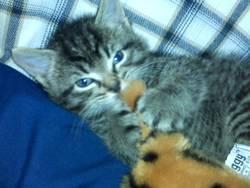
Do you have a new kitten? Are you considering bringing a kitten into your household? Coventry Animal Hospital will give you the scoop on kitten ownership and what to expect in the first six months of its life.
Kittens begin developing personalities at a very early age, once their eyes and ears are open. Generally, kittens are adopted between 6 to 8 weeks. It is a good idea to select a kitten that has been raised with positive interactions with humans. We encourage you to pick a healthy-looking kitten that has been socialized with other kittens and people.
Kittens are more likely to injure themselves through exploration than mature pets. Showing them the ropes from the beginning of their life is important to their safety. When bringing a kitten into your home, have a designated room prepared with food and water on one side and a new litter box on the other. Many kittens will instinctively use a litter box, but their chances of success are improved if they have a quiet private area in which to use it. The kitten will also need a scratching post, cat toys and several places to hide and safely climb. This room should be “kitten-proof” with secure window screens that they cannot escape from and without elastic bands, string or other small objects that could be ingested. 
Developing a consistent feeding schedule can also decrease a kitten’s stress level when faced with its new surroundings. After a week or so, when the kitten has acclimatized to its surroundings, it may be integrated into the household, but always returns to its safe room.
As with all pets, the best way to train them to adopt appropriate behaviours is to praise them when they behave in a positive manner. Kittens love being spoken to in a gentle voice, being petted on their own terms and being offered tasty treats. They will naturally be curious and want to play, so they should be directed to toys that they are allowed to play with. Kittens should not be allowed to play with fingers, toes or articles of clothing. It is recommended to expose your kitten to a carrier, as well as nail trimming, brushing its teeth, wearing a collar, getting brushed and having gentle play time.
An advantage of keeping a kitten separate for the first few weeks from other pets is preventing the spread of disease and parasites. Kittens should have their first visit to a veterinarian as soon as they are adopted, in order to make sure they are healthy. During the kitten consultation, preventive care, such as nutrition, behavior, deworming and vaccinations is discussed. Other topics addressed during the series of kitten visits include dental health, pet insurance, microchipping and neutering or spaying.
Feline Vaccines
There are core vaccines and non-core vaccines:
Core vaccines:
- FVRCP -Combination vaccine which provides protection against1) feline herpes virus, 2) feline calicivirus (both of which cause upper respiratory tract infection) as well as 3) feline panleukopenia virus, which is also known as distemper. Generally given at 8 weeks of age, then again as a booster at 12 weeks and 16 weeks.
- Rabies – Generally given at 4 months of age.
Non-core vaccines:
- Feline leukemia virus -May be appropriate for kittens that could have exposure to other cats outside. The kitten is tested for feline leukemia, inoculated at 12 weeks of age and again at 16 weeks. There is a small risk of vaccine reactions and ways to minimize these risks can be discussed with a veterinarian.
Very young kittens have maternal immunity (antibodies from the mother cat) which fade in the first few months of life. Early on, maternal immunity will block disease, as well as vaccines, but when it has faded, will not prevent disease. The purpose of the series of boosters is to ensure that the kitten is protected against disease during the window of time where maternal immunity is no longer protective.
Many kittens have parasites when they arrive at their new home including intestinal worms, giardia and fleas. We recommend  bringing in a fecal sample at the time of the kitten’s first visit in order to screen it for parasites. The kitten will be sent home with safe dewormer and flea medication.
bringing in a fecal sample at the time of the kitten’s first visit in order to screen it for parasites. The kitten will be sent home with safe dewormer and flea medication.
Spaying and neutering is recommended at 5 to 6 months of age, prior to sexual maturity. Please take a look at our blog on heat cycles in female cats, as well as OVARIOHYSTERECTOMY. You can log on to our website to see our library of veterinary written health articles.
Take lots of photos of your kitten, it will be an adult before you know it! Coventry Animal Hospital recommends annual exams for adult cats for ongoing preventive care. Getting your kitten on preventive care at an early age will maximize its likelihood of many healthy years to come.

